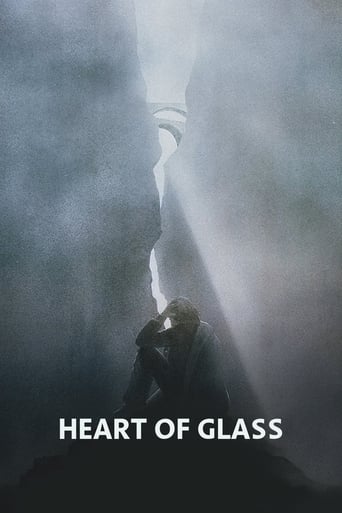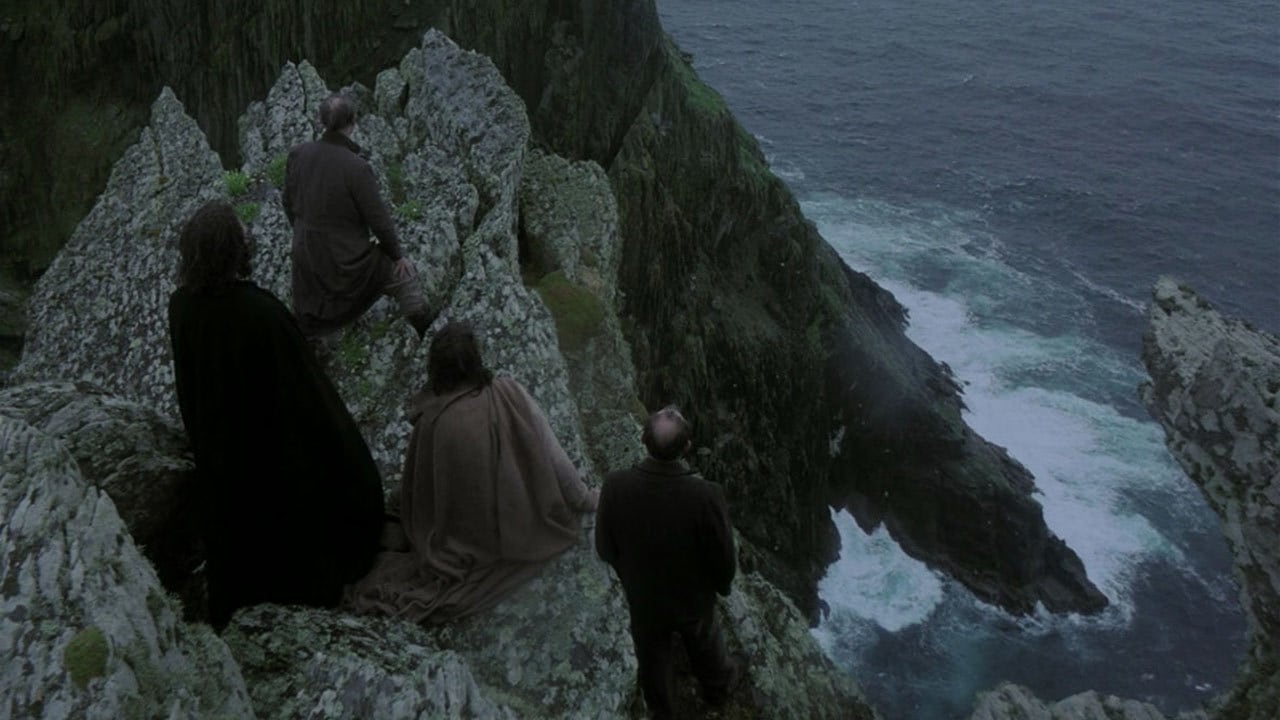jzappa
In the story of the breakdown of a small glassblowing factory in a Bavarian village around 1800, Werner Herzog's Heart of Glass sees the melancholy of communities depending on manufacture, the disconnectedness of people without a feeling of purpose. Dashed hopes and visions of a desolate future come in the guise of the soothsaying of a shepherd, who prophesizes in a hypnotic state. Stay with me here.This is one of the most legendary of Herzog's films, known as the one where most of the actors were put in trances for most of the scenes. It hasn't been seen much, maybe since it isn't to the predilection of most people. There's no orthodox story, no conclusion, and the final scene is an allegory apparently not related to anything that's gone before. The movie's like a piece of music, where everything is understood in terms of tone and ambiance.Herzog's panorama has two shots from the tops of peaks, looking down over the earth and the ocean. The rest of the movie is set in a few houses, a beer hall, a glass factory, and in the forest engulfing the village. The people rely on the manufacture of rose- colored glassware. The head glassmaker Muhlbeck has died, taking with him the secret of the glass. Reckless attempts are made to retrieve the formula, but all blunder. A sensible person might say the factory can make other kinds of glass. But there are no sensible people around here.The dialogue the actors perform under Herzog's hypnosis is delivered with a barren conviction. It lacks energy and identity. What if what we're really hearing are Herzog's own inflections as he hypnotized them and told them what to say? Is he acting through them? These are not really characters, though they have idiosyncrasies. They're people who have had their spirit taken from them by the deterioration of their work. It's a bleak life, but it's a purpose.The survivor of a drunken free-fall from a hayloft waltzes despairingly with his friend's corpse. People drink and stare. In a particularly memorable scene, one guy breaks a beer stein over another guy's head, who doesn't react. Then, he unhurriedly pours his own beer over the first one's head, again yielding no reaction. You can feel what Herzog is driving at. In reality, you don't break a mug over someone's head without some apparent rationale, but that's gratuitous for Herzog's intentions. He shows the animal texture of the two men fighting. They need no explanation. They're devoid of motivation, to fight or to live. They've been rendered into shells of despondency and bitterness. Some imagery works fine without literal interpretation. Heart of Glass seems to me to be such a piece of work. We may not quite know what it makes us think, but we know how it makes us feel.
chaos-rampant
Everything in this film is ritualized, solemn and somnabulent, a state of meditation. It works like a mandala, a symbol that represents in Buddhist lore a sacred space for the concentration of the mind.This goes beyond a stylization, indeed in a manner that defies our knowledge of Herzog, a man of the impromptu and the adventurous, here I discern a certain ceremonial importance. That is, if the film is important, it's because it derives power from the congregation, its audience. It's up to us to be devout or flippant, be absorbed or laugh it off. I mean this is a film where prophecies are fulfilled.It starts with a creation myth, almost by necessity born of destruction, and ends with a diluvian suggestion, with one of those unforgettable Herzogian images that haunt with the futility and madness of human struggle in a yawning indifferent universe. There's a quest here to discover the lost recipe of a glasswork masterpiece, the Ruby, to which we can read all manner of existential parables. Individually, as allegory, this is nothing new. Like meditation, the insight is not intellectual, if we approach it that way the film may seem ponderous, rather it flows from living an experience.There's a marvelous scene where we see glassworkers at work, blowing life into vials or glass horses. Herzog gives us a sharp contrast here between the sheer beauty of creation and the mundanity of it, one of the workers putting down his glasswork to take a sip of beer from a glass jug. The owners of the factory, son and disabled old father, don't even have that spontaneity to enjoy, they waste away in decadence and futile ruminations.How the unforgettable finale ties up to this is a guess, does it merely frame or does it mythically abstract.Like Tibetans work tirelessly day and night on mandalas only to destroy them upon completion as a palpable reminder that all things are transient, so is Heart of Glass a kind of vehicle, an artifice that serves a purpose only if we work on it. If we arrive anywhere by the finale, it's because we walked.
Chad Beattie (bgnish_rv)
Being a huge Herzog fan, normally loving all his films for the absurdity, I found this particular film being my least favorite. First of all, the plot is about the sacred ruby glass, in which the only person with the ability to make this infamous ruby glass dies without revealing the secret. You discover the plot within the first ten minutes, and it grows interest in you, but as the movie goes on, you drastically lose interest. As much potential as the plot had, it didn't really expand into all it was worth.To me, the plot didn't play an important role in the film. I was much more fascinated by the cast of the film, being hypnotized by Herzog (I'm still curious as to how Herzog hypnotized them.) It almost became hilarious during points of the movie. I found my mind sometimes wandering off the subtitles to focus on the minor characters in the background.Unlike other Herzog films, I didn't get much out of this one. Although it did have Herzog's favorite Man vs. Nature theme, I just couldn't take it for what it was. Of course, it did have some beautiful shots that could have been perfect if it wasn't for the horrible quality of the 16mm camera used. Not that I'm blaming Herzog for the lack of funds, just making a point.The whole atmosphere of the film was very "lynchian." The dialog, mostly. It was very obvious that David Lynch (Blue Velvet, Eraserhead) got a lot of inspiration from "Heart of Glass." In conclusion, I would ONLY recommend this movie to fans of Herzog (especially his older films: "Aquirre, the Wrath of God", "Even Dwarfs Started Small", etc) for the reason that they will understand it and get more out of it. However, to people who are unfamiliar with Herzog's older films, I would stay away from this one.
Cosmoeticadotcom
German filmmaker Werner Herzog is not an artist to be underestimated, even in his lesser films, like 1976's Heart Of Glass (Herz Aus Glaus) because his films tend to have a cumulative power, in that they get better with each successive viewing. OK, technically, the films are the same, but because they are so dense, layered, and multifarious, an appreciation and understanding of them is almost inevitable with a second or third viewing- one of the benefits that foreign films, and films with DVD commentaries afford and reward viewers with. The film in the Herzog canon this most reminds me of is his Even Dwarfs Started Small, another film that is so 'out there' it holds a fascination over the viewer, even if it fails to achieve greatness, or even coherence.Heart Of Glass combines the quirkiness of Even Dwarfs Started Small with the somnambulism of Night Of The Living Dead, the landscapes of the fictive Lord Of The Rings trilogy (albeit without the benefit of any special effects), and the period eye level realism of Herzog's own The Enigma Of Kaspar Hauser. The oft-repeated legend behind the film, propagated relentlessly by the notoriously tall tale telling Herzog, is that he personally hypnotized the whole cast, and one can almost believe it, given the leaden, faraway way the actors recite their lines. Yet, the film veers between this living cross between a marionette show and Noh theater and stunning musical interludes featuring the gorgeous landscapes (mountains, clouds, and waterfalls) of Bavaria and Alaska, often shot through gauzey filters that render the natural imagery as almost moving paintings upon a canvas; one designed to likewise lull the viewer into a mesmerized state. It is also like crossing mime with MTV music videos, only without having to laugh
. As usual, the music in the film, from the opening yodeling, to what seems to be monastic chanting, to the playing of a hurdy-gurdy, is excellent, and arranged by Popol Vuh's Florian Fricke. The cinematography, by Jörg Schmidt-Reitwein, as mentioned, is stunning, and many aspects of this film- from that cinematography, to certain odd sequences, such as a 'bar fight' between Wudy and Ascherl, where they break glass steins and pour beer over one another, or a later scene where Wudy dances with Ascherl's corpse, just lodge jaggedly in one's psyche, which show that the hypnotizing of the cast was something more than a mere 'gimmick' to sell the film. Also of note, in the cast, is an early Herzog cast regular, the dwarfish Clemens Scheitz, as the Master's man-servant, Adalbert. Thus, the film falls into that class of art beyond a good or bad axis, and onto one that is simply 'interesting' or 'worthwhile,' for it is not a masterpiece- as it is too unstructured and narratively anomic, nor is it a bad film- as it is too laden with great images and jaggedly lodged moments.Heart Of Glass is a film that seems to call out for critical dissection, even as such a task would rob the film of its ineffable power, such as poetic scenes of glassblowers attempting to replicate the Ruby Glass formula, or a scene of an ugly and retarded girl named Paulin dancing topless on a table with a duck that seems to have the beak wattle of a chicken or turkey. there is nothing that prepares one for such an image, but once it has been unreeled, there is no putting the proverbial genies back in the glass. That Heart Of Glass is only 94 minutes long is both a good and bad thing: good, for the tedium of some of the somnambulism bores, and bad, for the images could hold one's fascination for hours- sort of like Godfrey Reggio's Quatsi films do, only even more powerful. Werner Herzog shows, in this film, that a great artist can still touch greatness in works that are not his best, but it is the fact that a film like this, clearly in the lower half of the Herzog canon, is still leagues better than all but the top ten or twelve films put out by the American film marketing machine which proves that Herzog's work will live as long as, or longer than, the many legends his masterful films retell.


 AD
AD

